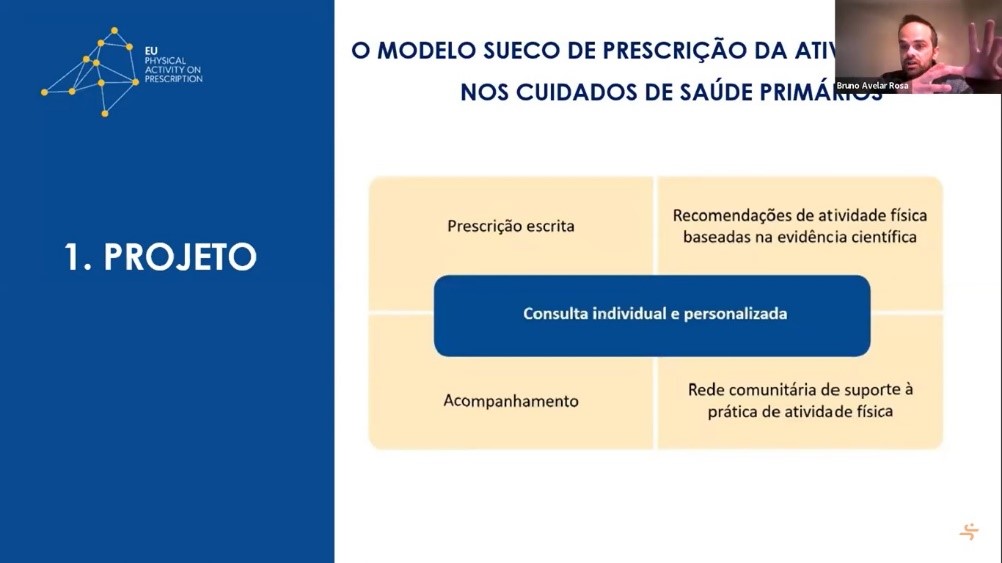The General-Directorate of Health, an organisation within the Ministry of Health, is leading the transfer and adaptation of the Swedish PAP in the country’s national health system, namely in the primary healthcare settings.
The mission of the General-Directorate of Health (GDH) is to regulate, guide and coordinate activities focused on the promotion of health and the prevention of disease, defining technical conditions for an adequate provision of health care. It is responsible for planning and monitoring the national policy for quality in the health system, as well as to ensure the implementation of the National Health Plan, which includes twelve Priority Programmes, with the National Programme for the Promotion of Physical Activity (PNPAF) being the most recent one. The GDH is also responsible for the coordination of the Ministry of Health’s international relations.
Following the creation of the PNPAF in 2016, it was published in 2017 in the Order no. 8932/2017, 10tf of October. This order stated the development and carry-out of a national pilot-project, focused on the promotion of physical activity in primary health care settings of the National Health System (NHS). This pilot project includes three main actions:
(1) Reinforce the integration of the promotion of physical activity in NHS (namely through informing, counselling and prescribing)
(2) Improve the knowledge of the health professionals working in the NHS through the provision of education and training activities, and
(3) Articulate the primary health care settings with the community in terms of resources that promote physical activity and exercise.
In this scope, the purpose of the GDH and specifically of the PNPAF in being involved in the EUPAP was to learn from the Swedish PAP approach and seek to work and share knowledge with other countries and organisations, some of them already with a mature PAP system, regarding the topic.
In Portugal, the Swedish PAP is adapted in the following way:
|
Patient-centred individualised counselling
|
The first two are parts of the Portuguese pilot and the third is part of the EUPAP implementation.
|
|
Written prescription
|
The written prescription is made by the GP and the physiotherapist in collaboration. A template based on the EUPAP prescription form was provided, but the teams involved were free to use their own prescription tools and forms.
|
|
Evidence based PA recommendation
|
The Portuguese FYSS-short version was provided to all the human resources in the pilot implementation, along with other material drafted by the PNPAF experts.
|
| Follow-up | The PAP intervention is intended to be done for 6 months. Within these 6 months, the patient meets the GP and the physiotherapist 4 times (the 1st consultation as a start, the 2nd consultation after 1 month, the 3rd after 3 months, and the 4th after 6 months). In between the consultations (with exception of time between the 3rd and 4th consultation) a phone call by the services is made to support the patient in the implementation of his or her personal PAP and to follow-up the process. |
|
Supporting environment, community-based network
|
The PAP is drafted considering the community resources. The physiotherapist is responsible to know the environment in terms of context and institutions. The community resources can include open-air facilities where to perform physical exercise, walkways, public health clubs or other specific resources that can be found in every setting. |
|
|
|
|
|
|
|
|
|
|
|
|
|
|
|
After a first try of launching the Portuguese PAP pilot in line with the implementation of EUPAP in the country that was cancelled due to the COVID-19 pandemic, the EUPAP-PT began to be implemented in April 2022. This implementation took place in 6 healthcare units (3 in the North region, 1 in the Centre Region and 2 in the Lisbon and Tagus-Valley region). Eight GP’s (4 health care units with 1 GP, and 2 healthcare units with 2 GP’s) and 12 physiotherapists (3 healthcare units with 1 physiotherapist, and 3 healthcare units with 3 physiotherapists) were involved in the process. Almost all of these human resources have participated in the EUPAP training that took place in Sweden in the beginning of the process. Those who participate become national focal points responsible for sharing knowledge in their scopes (GP’s and physiotherapists who work in the different regions and also within their peers) as it is aimed by EUPAP, but also stated in the Portuguese Order with the purpose of creating a “National Network of Health-Enhancing Physical Activity Trainers in Primary Health Care”.
A national implementation training (online) was also held on 8- 10 March. The first day of the training, (8 March) was open to the public and attended by around 600 people and this event is now available online.

Presenting the SwedishPAP core elements in the online training taken on 8 March and open to the public.
By 31 October (when the EUPAP implementation data collection was closed), there were 82 patients, 50 female and 32 male, involved in the PAP process (34 in the North region, 29 in the Centre region and 19 in the Lisbon and Tagus Valley region).Forty of them with diabetes type II (16 in the North region, 13 in the Centre region and 11 in the Lisbon and Tagus Valley region). Forty-two of them with depression (18 in the North region, 16 in the Centre region and 8 in the Lisbon and Tagus Valley region). The patients have an average age of 55.42 years old.
More healthcare units are about to launch their local pilots, not in the scope of EUPAP, but as a consequence of the approach developed within the project.

